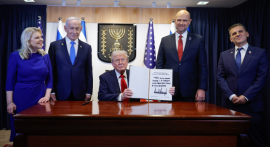
At a press conference marking the release of the International Society for Human Rights’ (ISHR) 2025 yearbooks, “Religious Freedom” and “Persecution and Discrimination of Christians,” ISHR President Thomas Schirrmacher said conditions for Christians have deteriorated markedly across many regions.
Speaking at the German Evangelical Alliance/Evangelische Allianz offices in Berlin, Schirrmacher described a broad spectrum of abuses facing believers: “This takes the form not only of direct violence (murders, kidnappings), but also of legislation, social discrimination, restrictions in public and private life and control of churches and religious services,” Schirrmacher said.
Schirrmacher, former secretary general of the World Evangelical Alliance—explained that the yearbooks assess contemporary threats to fundamental freedoms, examining state persecution, extremist violence, imperialist dominance, and anti-religious discrimination.
Highlighting two case studies, he said Islamist groups in Nigeria — including Boko Haram, Islamic State West Africa Province (ISWAP) and Fulani herdsmen militias — continue to target Christian communities with sustained attacks.
Looking ahead, he noted Nigeria is expected to become the world’s third-largest Christian country by 2050, yet the nation’s needs remain enormous, requiring more emergency medical personnel, early warning systems, and evacuation measures to avert further massacres.
Turning to South Asia, he said the situation in Pakistan is also deeply troubling, as Christians routinely suffer under discriminatory blasphemy laws; alongside this, abductions, forced conversions to Islam, and child marriages disproportionately harm girls from minority faiths, especially Hindus and Christians.
Identifying root causes, he pointed to two primary drivers of global anti-Christian persecution: first, dictatorial one-party regimes such as China, Cuba, and North Korea that treat Christians as threats and therefore subject them to strict surveillance and repression; second, militant political-religious movements and groups that victimize Christians.
He added that believers in Egypt, Syria, Nigeria, India, and Myanmar are particularly afflicted under these conditions.
He also cited examples of Islamic republics where state ideology fuses with religion to impose coercive control: Afghanistan, Iran, and Pakistan, which he said have “tied their social order to a religion in a totalitarian manner and ruthlessly enforce their religious-political coercive order with state resources.”
Thomas Rachel, Germany’s Federal Government Commissioner for Freedom of Religion and Belief and a member of the Bundestag, stressed that defending freedom of religion and belief remains a core component of the federal government’s human rights policy.
From the Evangelische Allianz Deutschland, political representative Johann Matthies drew attention to the plight of Ukrainian Christians, condemning the systematic persecution of independent religious communities—especially Evangelical free churches—by Russian authorities since the 2014 occupation of Crimea and Donbas.
He warned that these repressive practices have intensified in newly occupied areas, stating, “By mid-2023, Russian authorities had closed almost all independent religious communities in the Zaporizhzhia and Kherson regions.”



















